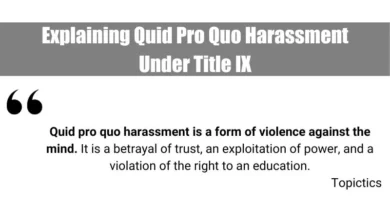Can an Unethical Aid be Considered Quid Pro Quo?
An unethical aid can be considered quid pro quo when it involves an exchange where something of value is given or received in return for a specific action or benefit. In legal contexts, particularly concerning bribery or corruption, quid pro quo implies a direct exchange where an official action or decision is made in return for a benefit, such as a payment or favor.
The unethical nature of the aid does not negate its qualification as quid pro quo if it meets the criteria of a transactional exchange where both parties anticipate and understand the reciprocal arrangement.
Takeaways
| Key Points |
|---|
| Unethical aid refers to assistance given in violation of ethical principles, often intended to manipulate decisions or gain undue advantage, while quid pro quo involves exchanging favors where one party provides a benefit expecting something in return. |
| The intersection of these concepts arises in various sectors like politics, business, and employment, where unethical aid turns into quid pro quo arrangements, leading to conflicts of interest, corruption, and loss of public trust. |
| Legal frameworks such as the U.S. Foreign Corrupt Practices Act and U.K. anti-bribery laws aim to prevent such unethical exchanges, with notable cases like McDonnell v. United States highlighting the complexities of prosecuting quid pro quo corruption. |
| Ethical decision-making models, including rights ethics, justice ethics, and virtue ethics, help distinguish unethical aid from legitimate incentives by assessing intent, transparency, and reciprocity, ensuring aid is given fairly without coercion. |
| Misinterpreting unethical aid as quid pro quo can result in legal penalties, reputational damage, and loss of trust, making transparency, accountability, and ethical leadership essential in preventing corrupt practices within organizations and institutions. |
Introduction to Unethical Aid and Quid Pro Quo
Definition of Unethical Aid
Unethical aid refers to any assistance or benefit given or received in violation of ethical standards or moral principles. This can include financial aid, gifts, favors, or any other benefit provided to influence decisions, actions, or behaviors in an unethical manner.
The key aspect of unethical aid is its intent—it is often used to gain undue advantage or to manipulate a situation unfairly.
Definition and Context of Quid Pro Quo
Quid pro quo, a Latin term meaning “something for something,” refers to an arrangement where one party provides a benefit or favor in exchange for something of value from another party. In legal and ethical contexts, quid pro quo is often scrutinized when it involves transactions or interactions that could be considered coercive, manipulative, or corrupt.
It is particularly concerning when power dynamics are at play, such as politics, business, or employment, where one party may feel compelled to provide something in return for a favor to avoid negative consequences.

How they Intersect
The intersection of unethical aid and quid pro quo arises when the aid provided is not merely a gift or favor but is given with an expectation of receiving something in return, creating a transactional relationship.
This becomes problematic in various sectors, including government, healthcare, and business, where such exchanges can lead to conflicts of interest, corruption, and loss of public trust. For example, in politics, offering financial contributions to a campaign in exchange for favorable legislation constitutes a clear case of unethical aid being used as quid pro quo. Similarly, in the corporate world, providing lavish gifts to decision-makers in return for business contracts can be seen as unethical aid with a quid pro quo arrangement.
Examples:
Here are some examples of unethical aid that could be considered quid pro quo:
- Political Contributions for Legislation: A business donates a large sum of money to a politician’s campaign with the expectation that the politician will support legislation favorable to the business’s interests. This constitutes unethical aid as quid pro quo, as the donation is intended to influence the politician’s actions directly.
- Lavish Gifts for Contracts: A company offers an expensive gift or an all-expenses-paid vacation to a government official or corporate decision-maker in exchange for being awarded a lucrative contract. This is a quid pro quo arrangement because the gift is given with the expectation of receiving a specific business benefit.
- Employment Opportunities for Favors: An individual in a position of power offers a high-paying job or a promotion to someone in exchange for insider information, favorable treatment, or some other benefit. The employment offer serves as unethical aid meant to obtain a reciprocal favor.
- Personal Loans for Policy Changes: A business leader provides a personal loan to a public official with the expectation that the official will advocate for policy changes that favor the business. This is considered quid pro quo because the loan is given with a clear expectation of policy influence in return.
- Preferential Treatment in Exchange for Support: A manager at a company promises preferential treatment or career advancement to an employee in exchange for personal favors, loyalty, or silence on unethical practices within the organization. This forms a quid pro quo arrangement, as the advancement offer is contingent upon the employee’s actions.
These examples illustrate how unethical aid can create a quid pro quo situation, where an individual or entity provides something of value with the expectation of receiving a specific benefit in return, often compromising ethical standards and fairness.
Legal Frameworks and Ethical Standards
Legal Framework
Legal frameworks governing unethical aid and quid pro quo vary across jurisdictions. Still, they aim to prevent corruption, ensure fairness, and maintain public trust. In the United States, for example, laws like the Foreign Corrupt Practices Act (FCPA) prohibit offering anything of value to foreign officials to influence their decisions.
Similarly, anti-bribery laws in the U.K. and other countries establish stringent regulations against quid pro quo arrangements, especially when they involve public officials or lead to unfair advantages in business transactions. These laws are designed to deter practices that could undermine the integrity of institutions and ensure that decisions are made based on merit rather than personal gain.

Case Laws and Notable Legal Precedents Addressing Unethical Aid as Quid Pro Quo
Several legal cases, such as quid pro quo, have set important precedents regarding unethical aid. One notable example is the McDonnell v. United States case, where the U.S. Supreme Court narrowed the definition of what constitutes an “official act” in a quid pro quo arrangement, thereby affecting the prosecution of corruption cases. The court ruled that routine political activities such as setting up meetings or hosting events do not necessarily constitute official acts unless there is an explicit exchange of favors.
This case highlights the complexities of defining and prosecuting quid pro quo scenarios, particularly when distinguishing between legal lobbying efforts and illegal, corrupt practices.
Ethical Decision-Making Models
Ethical Lenses
Ethical decision-making models provide frameworks to evaluate whether an action, such as providing aid, is ethical. Several models can be applied to analyze cases of unethical aid being considered quid pro quo:
- Rights Ethics: Focuses on upholding the rights of all parties involved and ensuring that actions do not infringe upon those rights.
- Justice Ethics: Emphasizes fairness and equality, ensuring that aid is distributed based on merit and need rather than personal relationships or favors.
- Utilitarianism: Considers the greatest good for the greatest number, evaluating whether the aid provided leads to a beneficial outcome for the majority.
- Common Good Ethics: Examines the impact of aid on the community and whether it contributes to society’s overall well-being.
- Virtue Ethics: Focuses on the character and intentions of the person providing the aid, assessing whether their actions align with moral virtues such as honesty and integrity.
- Care Ethics: Emphasizes the importance of relationships and caring for others, ensuring that aid is provided in a manner that respects the dignity and well-being of all parties involved.

Application in Cases
Applying these ethical lenses to cases of unethical aid being considered quid pro quo can provide a nuanced understanding of the situation. For instance, using the justice ethics lens, providing aid in exchange for political favors would be deemed unethical as it undermines fairness and equality.
From a practical perspective, aid would not be justified if it results in a negative outcome for the broader community. Similarly, virtue ethics would condemn actions that involve deceit or manipulation, regardless of the outcomes.
Comparative Analysis: Unethical Aid vs. Ethical Incentives
Distinguishing Unethical Aid from Legitimate Incentives and Rewards
Unethical aid and legitimate incentives are distinguished primarily by the intent and context of the exchange.
Ethical incentives are provided as a form of recognition or reward for performance, achievement, or merit without any expectation of reciprocation beyond what is fair and deserved. They are transparent, adhere to established guidelines, and are given in a manner that does not improperly influence decision-making. In contrast, unethical aid is often concealed, lacks transparency, and is provided with the expectation of receiving something in return, often compromising the recipient’s ability to make impartial decisions.
Differentiating Factors
Several factors differentiate unethical aid from legally and ethically permissible actions:
- Intent: The purpose behind providing aid or incentives is a key determinant. Ethical incentives are given to encourage or reward desirable behavior, while unethical aid is intended to manipulate or coerce.
- Transparency: Ethical incentives are typically documented, with clear criteria and processes, whereas unethical aid is often hidden or disguised.
- Reciprocity: Ethical incentives do not require reciprocation beyond what is fair, while unethical aid is often part of a quid pro quo arrangement.
- Impact: Ethical incentives positively impact motivation and performance without compromising integrity. At the same time, unethical aid can lead to corruption and loss of trust.

Examples of Ethical Incentives
Examples of ethical incentives include bonuses based on performance, awards for achievements, and grants or scholarships provided based on merit. These incentives are structured to recognize and reward positive contributions without expecting anything in return that could compromise the fairness of the decision-making process.
Unlike quid pro quo arrangements, these incentives are provided openly, with clear criteria, and are aligned with ethical standards and legal requirements.
Consequences of Misinterpreting Unethical Aid as Quid Pro Quo
Potential Legal, Ethical, and Social Consequences for Organizations and Individuals
Misinterpreting unethical aid as quid pro quo can lead to severe legal, ethical, and social consequences. Organizations found guilty of engaging in corrupt practices may face legal penalties, including fines and sanctions.
Individuals involved may face criminal charges, loss of professional licenses, and reputational damage, which could affect their careers and personal lives.
Ethically, such practices undermine trust and integrity, leading to a toxic organizational culture and loss of stakeholder confidence.
Impact on Trust, Reputation, and Operational Dynamics Within Organizations
Organizations that engage in or are perceived to engage in quid pro quo arrangements suffer from losing trust among employees, clients, and the public. This erosion of trust can impact employee morale, reduce customer loyalty, and harm relationships with partners and stakeholders.
It can also lead to operational inefficiencies as the focus shifts from merit-based decision-making to fulfilling unethical obligations, ultimately affecting the organization’s performance and success.

The Role of Transparency and Accountability in Preventing Unethical Practices
Transparency and accountability are crucial in preventing unethical practices, including unethical aid and quid pro quo arrangements. Organizations can ensure that decisions are made fairly and ethically by promoting open communication, establishing clear guidelines, and enforcing accountability measures.
Regular audits, compliance training, and whistleblower protections are essential in fostering an environment where unethical practices are identified and addressed promptly.
Preventative Measures and Best Practices
Guidelines and Strategies for Organizations
Organizations can adopt several strategies to avoid unethical aid and quid pro quo scenarios. These include implementing strict policies on gifts and donations, establishing clear guidelines for interactions with external parties, and ensuring that all transactions are transparent and documented.
It is also essential to create a culture of ethics and integrity where employees understand the importance of ethical behavior and are encouraged to report suspicious activities.
Implementation of Ethical Training and Awareness Programs
Ethical training and awareness programs are vital in educating employees about the importance of ethical conduct and the potential consequences of unethical practices. These programs should cover topics such as recognizing unethical behavior, understanding legal and ethical obligations, and reporting mechanisms. Regular training sessions, workshops, and seminars can reinforce the importance of ethics and help prevent unethical practices.
Role of Leadership and Culture in Fostering Ethical Behavior
Leadership plays a critical role in fostering ethical behavior within an organization. Leaders must set the tone from the top and demonstrate a commitment to ethics and integrity in all their actions.
Leaders can influence the organization’s culture by modeling ethical behavior and encouraging employees to adhere to high ethical standards. A strong ethical culture, supported by effective leadership, can help prevent unethical aid and quid pro quo arrangements.
Conclusion
When considered quid pro quo, unethical aid poses significant legal, ethical, and social risks. It undermines trust, damages reputations, and can lead to severe penalties for individuals and organizations.
By understanding the legal frameworks, applying ethical decision-making models, and harming stakeholder relationships.
Understanding the nuances of unethical aid and quid pro quo is crucial for maintaining ethical integrity in any professional environment.
By implementing strong ethical standards, transparent policies, and effective training programs, organizations can protect themselves from the risks associated with unethical practices and foster a culture of accountability and trust.
FAQ
What distinguishes unethical aid from quid pro quo?
Unethical aid involves providing assistance that breaches ethical standards, often without an explicit expectation of return. Quid pro quo, Latin for “something for something,” refers to a direct exchange where one party offers something of value, expecting a specific favor or benefit in return. While all quid pro quo arrangements involve an exchange, not all are unethical; the ethicality depends on the context and intent.
Can accepting a gift be considered quid pro quo?
Accepting a gift can be considered quid pro quo if the gift is given with the expectation of a specific favor or action in return. For instance, if a business executive receives an expensive gift from a supplier and, as a result, favors that supplier in contract decisions, it constitutes a quid pro quo arrangement. The key factor is the intent behind the gift and the subsequent actions taken.
Is quid pro quo always illegal?
Quid pro quo arrangements are not inherently illegal. In many business transactions, exchanging goods or services of equal value is standard practice. However, when such exchanges involve bribery, coercion, or violate ethical standards—such as offering something of value to influence a public official’s actions—they become illegal and unethical.
How does quid pro quo manifest in the workplace?
In the workplace, quid pro quo often refers to employment benefits contingent upon an employee providing sexual favors or other personal benefits. For example, a supervisor promising a promotion in exchange for a date constitutes quid pro quo sexual harassment, which is both unethical and illegal.
What are the legal implications of quid pro quo in politics?
In politics, quid pro quo can lead to charges of corruption or bribery. For instance, if a politician accepts campaign contributions in exchange for political favors, such as supporting specific legislation, it constitutes an illegal quid pro quo arrangement. Such actions undermine public trust and violate legal statutes designed to prevent corruption.
Can charitable donations be considered quid pro quo?
Charitable donations can be considered quid pro quo if the donor expects a specific benefit in return. For example, a donor contributing to a nonprofit expecting to receive a leadership position or influence over the organization’s decisions creates a quid pro quo scenario. Ethically, donations should be given without expectations of personal gain.
How can organizations prevent unethical quid pro quo arrangements?
Organizations can prevent unethical quid pro quo arrangements by establishing clear policies that define acceptable behavior, providing regular ethics training, and implementing robust reporting mechanisms for unethical conduct. Fostering a culture of transparency and accountability ensures that all transactions and interactions are conducted ethically.
Are there cultural differences in perceptions of quid pro quo?
Yes, cultural norms influence perceptions of quid pro quo. In some cultures, exchanging favors is common and may not be viewed as unethical. However, such exchanges, especially in professional settings, are considered inappropriate in others. Understanding cultural contexts is essential when evaluating the ethical implications of quid pro quo arrangements.
How does intent determine if an action is quid pro quo?
Intent is crucial in determining whether an action constitutes quid pro quo. If an individual provides something of value with the expectation of receiving a specific benefit in return, it indicates a quid pro quo arrangement. Without such intent, the action may not meet the definition of quid pro quo.
How does quid pro quo differ from a standard business transaction?
While both involve exchanges, quid pro quo implies an expectation of a specific favor or action in return, often in contexts where such exchanges are unethical or illegal, like bribery. Standard business transactions are typically transparent, mutually agreed upon, and conducted within legal and ethical boundaries.









